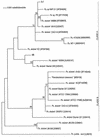Free-living heterotrophic nitrogen-fixing bacteria isolated from fuel-contaminated antarctic soils
- PMID: 12324373
- PMCID: PMC126386
- DOI: 10.1128/AEM.68.10.5181-5185.2002
Free-living heterotrophic nitrogen-fixing bacteria isolated from fuel-contaminated antarctic soils
Abstract
Five bacterial isolates enriched from fuel-contaminated Antarctic soils fixed nitrogen in the dark heterotrophically and nonsymbiotically. Two isolates utilized jet fuel vapors and volatile hydrocarbons for growth but not in N-deficient medium. Bacteria such as these may contribute to in situ biodegradation of hydrocarbons in Antarctic soils.
Figures


Similar articles
-
Polycyclic aromatic hydrocarbons in fuel-oil contaminated soils, Antarctica.Chemosphere. 1999 Dec;39(13):2201-7. doi: 10.1016/s0045-6535(99)00144-7. Chemosphere. 1999. PMID: 10576095
-
Degradation of polycyclic aromatic hydrocarbons by microbial consortia enriched from three soils using two different culture media.Environ Pollut. 2013 Jul;178:152-8. doi: 10.1016/j.envpol.2013.03.004. Epub 2013 Apr 9. Environ Pollut. 2013. PMID: 23570783
-
Trichoderma longibrachiatum Evx1 is a fungal biocatalyst suitable for the remediation of soils contaminated with diesel fuel and polycyclic aromatic hydrocarbons.Environ Sci Pollut Res Int. 2016 May;23(9):9134-43. doi: 10.1007/s11356-016-6167-6. Epub 2016 Feb 1. Environ Sci Pollut Res Int. 2016. PMID: 26832871
-
Biodegradation of polycyclic aromatic hydrocarbons: Using microbial bioelectrochemical systems to overcome an impasse.Environ Pollut. 2017 Dec;231(Pt 1):509-523. doi: 10.1016/j.envpol.2017.08.048. Epub 2017 Aug 29. Environ Pollut. 2017. PMID: 28841503 Review.
-
Hydrocarbon spills on Antarctic soils: effects and management.Environ Sci Technol. 2004 Mar 1;38(5):1265-74. doi: 10.1021/es0305149. Environ Sci Technol. 2004. PMID: 15046325 Review.
Cited by
-
Desert gerbils affect bacterial composition of soil.Microb Ecol. 2013 Nov;66(4):940-9. doi: 10.1007/s00248-013-0263-7. Epub 2013 Jul 16. Microb Ecol. 2013. PMID: 23857378
-
Azospirillum spp. from Plant Growth-Promoting Bacteria to Their Use in Bioremediation.Microorganisms. 2022 May 20;10(5):1057. doi: 10.3390/microorganisms10051057. Microorganisms. 2022. PMID: 35630499 Free PMC article. Review.
-
Analysis of nifH gene diversity in red soil amended with manure in Jiangxi, South China.J Microbiol. 2009 Apr;47(2):135-41. doi: 10.1007/s12275-008-0184-1. Epub 2009 May 2. J Microbiol. 2009. PMID: 19412595
-
Identities of epilithic hydrocarbon-utilizing diazotrophic bacteria from the Arabian Gulf Coasts, and their potential for oil bioremediation without nitrogen supplementation.Microb Ecol. 2010 Aug;60(2):354-63. doi: 10.1007/s00248-010-9702-x. Epub 2010 Jun 22. Microb Ecol. 2010. PMID: 20567813
-
Development of a bacterial consortium comprising oil-degraders and diazotrophic bacteria for elimination of exogenous nitrogen requirement in bioremediation of diesel-contaminated soil.World J Microbiol Biotechnol. 2019 Jun 20;35(7):99. doi: 10.1007/s11274-019-2674-1. World J Microbiol Biotechnol. 2019. PMID: 31222505
References
-
- Aislabie, J., J. Foght, and D. Saul. 2000. Aromatic hydrocarbon-degrading bacteria from soil near Scott Base, Antarctica. Polar Biol. 23:183-188.
-
- Aislabie, J., M. McLeod, and R. Fraser. 1998. Potential for biodegradation of hydrocarbons in soil from the Ross Dependency, Antarctica. Appl. Microbiol. Biotechnol. 49:210-214.
-
- Balks, M., J. Kimble, R. Paetzold, J. Aislabie, and I. Campbell. 2001. Effects of hydrocarbon contaminants on the temperature and moisture regimes of cryosols of the Ross Sea region, Antarctica, p. 33-39. In Collected proceedings, 2nd International Conference on Contaminants in Freezing Soil. Scott Polar Research Institute, Cambridge University, Cambridge, United Kingdom, in association with Geotechnical Science Laboratories, Carleton University, Ottawa, Canada.
-
- Chan, Y.-K., W. L. Barraquio, and R. Knowles. 1994. N2-fixing pseudomonads and related soil bacteria. FEMS Microbiol. Rev. 13:95-118.
-
- Coty, V. F. 1967. Atmospheric nitrogen fixation by hydrocarbon-oxidizing bacteria. Biotechnol. Bioeng. 9:25-32.
Publication types
MeSH terms
Substances
LinkOut - more resources
Full Text Sources
Other Literature Sources
Molecular Biology Databases

